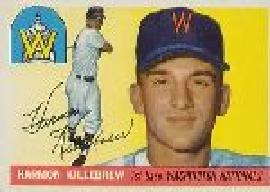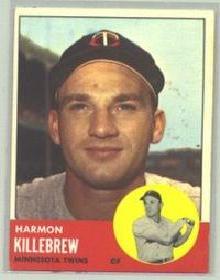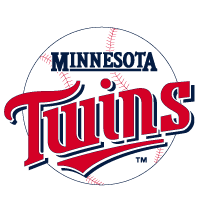






 |  |  |  |  |  |  |
 |
 |
|
Killebrew was raised in a farming community in Payette, Idaho. He quickly established himself as gifted athlete, and was a high school All-State quarterback. While playing in an impromptu baseball game Senators scout Ossie Bluege saw his powerful hits and reported back to Washington. He was snatched up by the Washington Senators who offered the 17 year old a surprising $30,000 package, an annual salary of $6,000, the league minimum, and a yearly bonus of $4,000. Since Killebrew was a "bonus baby" he spent the next five years sitting on the bench only getting some minor league playing time, before getting the chance to prove his power. Finally, opening day of the 1959 season Killebrew had his first year as a Senator regular. He was not an instant success as a Major League player, but eventually with practice and patience he became a major league hitter.
The Washington Senators moved to Minnesota in 1961 to become the Minnesota Twins, and Killebrew had his best year. While playing for the Twins he had 48 homers in 1962, 45 in 1963 and 49 in 1964. The Twins started getting respect in the industry due to this hard hitting player, and in 1969 he led the Twins to the first American League West title. In 1968 he suffered from a ruptured hamstring which almost ended his career, but bounced back in 1969 and played all 162 games. During his career he did not play a specific position and often played two different positions in one game. Killebrew could typically be found on third base, first base or the outfield. He was a valuable fielder because of his well-known agility.
Despite his "Killer" nickname and his powerful style of play, Killebrew was in fact a quiet, kind man who was not much given to the partying lifestyle enjoyed by his peers. Asked once what he liked to do for fun, Killebrew replied, "Well, I like to wash dishes, I guess."
His last big hitting season was 1970 were he led the Twins into a division title with 41 homers. After difficult 1971 and 1972 seasons Killebrew played less frequently, and began to serve mainly as a part-time designated hitter. His home runs went from 41 in 1970 to 28 in 1971; by 1972 he only hit 26 homers. He ended his big league career in 1975 with the Kansas City Royals. After his retirement he became a Twins broadcaster, later he started an insurance business, Killebrew & Harding, Inc. in Boise, Idaho with a former U.S. Congressman.
Killebrew had numerous achievements during his baseball career. In 1959 he won the home run title with 42 homers. He was able to hit over 40 home runs eight times in his career. In 1969 he won the Most Valuable Player award when he hit 49 home runs. His record makes him third behind Babe Ruth and Ralph Kiner in home run percentage with 7.0. His career total for home runs is 573, and was he named an American League All-Star 11 times. In 1984 Killebrew was inducted to the National Baseball Hall of Fame
Common Folklore suggests that the silhouette of Harmon Killebrew swinging a bat is the official logo of Major League Baseball. However, MLB.com states the following: "The MLB logo: No one player has ever been identified as the model of the 1969 Major League Baseball batter logo"
Harmon Killebrew quotes
"I didn't have evil intentions, but I guess I did have power."
"My father used to play with my brother and me in the yard. Mother would come out and say, 'You're tearing up the grass.' 'We're not raising grass,' Dad would reply. 'We're raising boys.' "
"Life is precious and time is a key element. Let's make every moment count and help those who have a greater need than our own."
"Look for the seams [on a knuckleball] and then hit in-between them."
"I didn't think much about batting average when I was playing."
"I found out early in life I could hit a baseball farther than most players, and that's what I tried to do."

 |  |  |  |  |  |  |